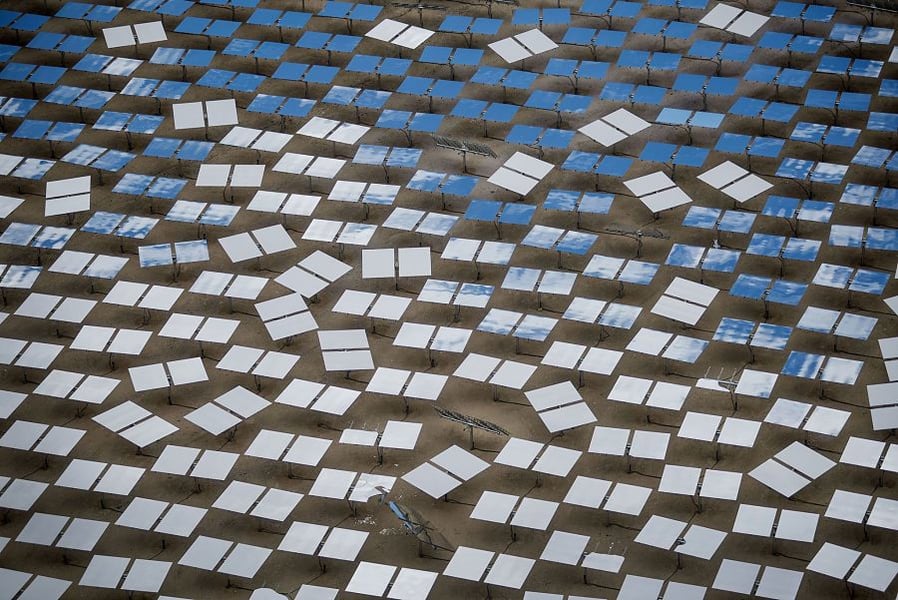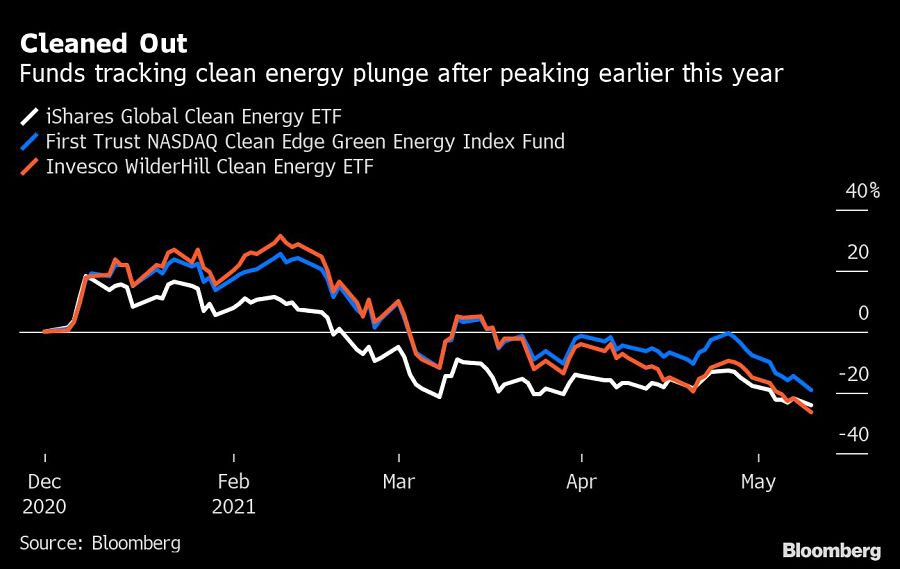

After a stellar 2020, the record-breaking boom in clean energy funds is rapidly giving way to a bust.
Investors are yanking cash from the sector at the fastest pace in a year, while two of the biggest exchange-traded funds tracking the industry -- the iShares Global Clean Energy ETF (ICLN) and Invesco Solar ETF (TAN) -- have each tumbled at least 24% in 2021. Since the beginning of May, about $154 million has been pulled from clean energy ETFs.
Thank the pressure on big-tech stocks. Funds that have higher environmental, social and governance standards have long benefited from substantial stakes in giant growth companies. Now a post-pandemic economic recovery is triggering a rotation to cheaper shares, and the benefits are swiftly becoming drawbacks.
“They had such a huge run in 2020, but like many of these momentum and growth funds, they have given back much of their gains in 2021,” said Mohit Bajaj, director of ETFs for WallachBeth Capital. “Now we are seeing a rotation out of those into more value-oriented names.”

Further details on President Joe Biden’s $2.25 trillion infrastructure plan haven’t been greeted with the enthusiasm that many analysts had hoped. In addition, several clean energy funds took a hit late last month after Enphase Energy Inc. -- a popular holding -- reported semiconductor shortages and supply chain issues.
“A return to clean-energy ETF inflows exceeding January’s $5 billion may require a performance rebound,” Adeline Diab, an ESG analyst for Bloomberg Intelligence, wrote in a note Tuesday. “Rising interest rates, widening competition and strained supply chains have tapped the brakes on flow momentum.”
Assets in the category have dropped for the past three months in a row and are now at $18.1 billion. That’s down from their peak of $22.3 billion at the end of January.
Other large clean energy ETFs such as the First Trust NASDAQ Clean Edge Green Energy Fund Index (QCLN) and the Invesco Wilderhill Clean Energy ETF (PBW) are also facing outflows amid a slide of more than 18% this year.
With their heavy tech exposures, the pain that clean energy funds are facing could just be getting started. JPMorgan Chase & Co. strategist Marko Kolanovic warned last week that big allocations into growth and ESG strategies may leave money managers vulnerable to inflation. As data continue to point to higher prices of goods and services, he bets investors will be forced to shift from low-volatility plays to value stocks.
“As money rotates away from those emerging growth themes and into the more economically sensitive areas of the market, clean tech becomes a source of funds,” said Dan Russo, portfolio manager at Potomac Fund Management.

Catch-up contributions, required minimum distributions, and 529 plans are just some of the areas the Biden-ratified legislation touches.

Following a similar move by Robinhood, the online investing platform said it will also offer 24/5 trading initially with a menu of 100 US-listed stocks and ETFs.

The private equity giant will support the advisor tech marketing firm in boosting its AI capabilities and scaling its enterprise relationships.

The privately backed RIA's newest partner firm brings $850 million in assets while giving it a new foothold in the Salt Lake City region.

The latest preliminary data show $117 billion in second-quarter sales, but hints of a slowdown are emerging.
Orion's Tom Wilson on delivering coordinated, high-touch service in a world where returns alone no longer set you apart.
Barely a decade old, registered index-linked annuities have quickly surged in popularity, thanks to their unique blend of protection and growth potential—an appealing option for investors looking to chart a steadier course through today's choppy market waters, says Myles Lambert, Brighthouse Financial.
